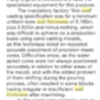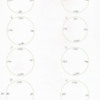quote:
Originally posted by LF - TP 2511:
... George ...
On cylinder number 1 you have 0.060 on a non-thrust wall, on cylinder number 3 you have 0.048 on a non-thrust wall

, on cylinder number 4 you have 0.070 on a non-thrust wall, on cylinder number 5 you have 0.107 on a
thrust wall, and on cylinder number 6 you have 0.067 and 0.080 on the non-thrust walls. My limits are 0.120 on the major AND minor thrust walls, plus 0.080 on the non-thrust walls ...
AFTER they have been bored.
You realize that 0.048 isn't much thicker than the cellophane wrapper on a package of cigarettes?
The nominal cylinder wall thickness of a 4.000 351C bore is quoted to be 0.160. Ford limited boring to 0.030, that would reduce "nominal" wall thickness to 0.145. I forget where the 0.120 number comes from, Ford or elsewhere. However I think this number came up after electronic cylinder wall thickness measurement became available ... we take the ability to "sonic check" cylinder walls for granted these days, it wasn't always an option.
I would like to explain something however. I've already given you and Frank my best advice. Here's the best way I can explain my reasoning to you. When the valve guides in a cylinder head are worn we don't replace the cylinder head ... we install bronze valve guide liners, or we press-in bronze valve guides. The result is a better valve guide, more compatible with stainless steel valve stems, and far more wear resistant (durable) than the valve guide based upon the original iron casting. The same principles and results hold true with cylinder liners. The good quality "spun" liners are made of a better alloy, with better metallurgy and better grain control, than the original iron block casting. They are a better match for piston rings, they are more wear resistant, and they are stiffer, i.e. less prone to flex. The good quality "spun" liners are an improvement to the block, as are bronze valve guides to a cylinder head. Yes they are more expensive than a simple over-bore ... but if you discount the price of purchasing another block, well the price of the liners starts looking like a good deal considering the benefits. At least in my book.
If the block in question has no other issues other than the cylinder walls having been previously over-bored to their limits, I would install liners rather than throwing money away on other used blocks of unknown quality ... which is simply gambling, and since the blocks you're buying are 40 years old, the odds aren't all that good.
Obviously I don't perceive the installation of dry liners the same way others do.



